|
MRS. B. S.
HANKINS
TAKES CHARGE
OF THE
DESOTO HOTEL
In April of
1898,
Mrs. B. S. Hankins
became the
new manager
of the
DeSoto
Hotel when
H. A.
Williams
retired.
She was formerly
the owner of
the Gold
Hotel in
Bartow, and
the
Commercial
boarding
house in
Tampa and
was said to
have
considerable
experience
in the
management
of hotels.
Not much
more is said
about her in
the Tampa
newspapers
other than
her name,
which was
always some
variation of
B. S.
Hankins
(D.S., G.S,
S.B, etc.)
The article
below goes on to
describe the
DeSoto and
the plan
Mrs. Hankins
had to
improve the
hotel, such
as offering
special
rates to
Tampa
people.
Special
attention
would be
given to the
cuisine,
"and the
table will
at all times
be supplied
with the
best the
market
affords."

The Desoto
re-opened on
Apr. 5, 1898
with Mrs.
Hankins as
the new
manager,
formerly
owner of the
Commercial
house in
Tampa.
She is
credited
with having
"a
considerable
amount of
management
of hotels in
Florida."
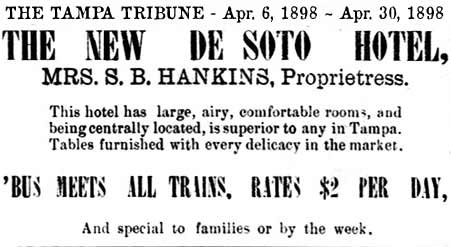
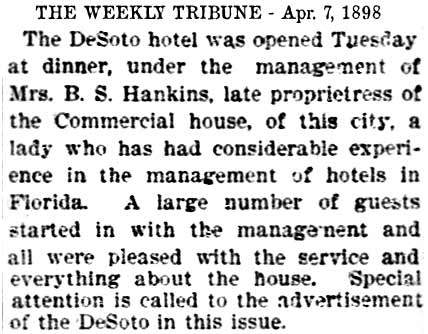
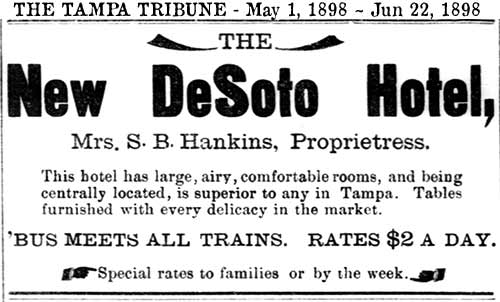
|
MRS. B. S.
HANKINS and
THE HANKINS
FAMILY OF
BARTOW IN
TAMPA
Mrs. B. S.
Hankins was
the wife of
Bethel
Stevens
Hankins,
a.k.a.
Gilpin or
just "Gilp"
Hankins,
which was his
nickname.
One of
Gilp's
brothers who he
partnered
with in his
Tampa
saloon business was Sylvanus
Masters
Hankins, who was
also known as "Marter.**"
Their
father,
William
Wesley
Hankins, was
one of eight
children of
pioneer
farmer
Dennis
DuPont
Hankins who
owned a
large
plantation
in Madison
County.
Dennis was a
Methodist
preacher and
is credited
with
starting a
Methodist
Church in
Madison
County.
He was
married to
Sarah Connor
and served
as a Justice
of Peace for
Madison Co.
at Cherry
Lake.
**Photos
from the
Florida
Memory
website name
him as "Sylvanus
Mortimer
Hankins."
|
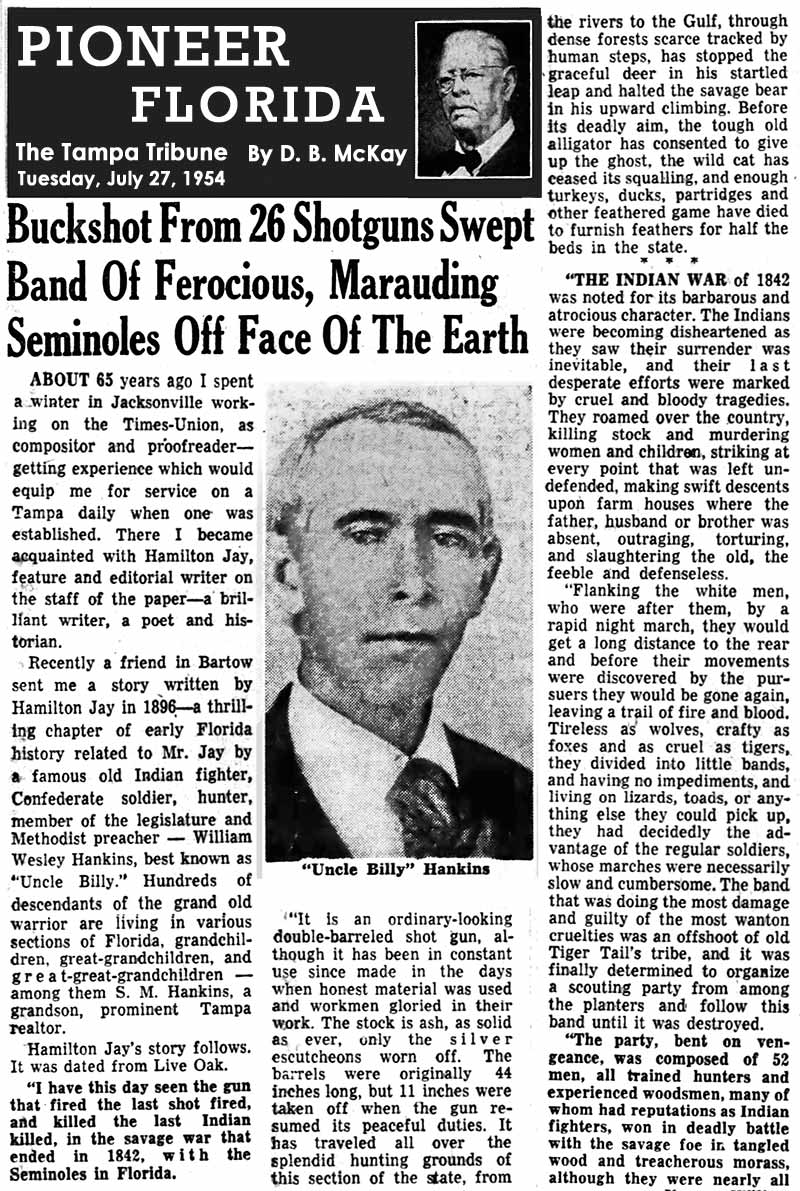 |
|
The article above is only a small excerpt from a much larger article. Click the image to view the whole article, then click the larger one to see full size. |
Gilp's and
Marter's
father,
William
Wesley
Hankins, was
a gunsmith
and dry
goods store
owner in
Bartow.
In town, and
in most of
the state,
he was known
as "Uncle
Billy
Hankins." He
was a
skillful
hunter and
is credited
with firing
the last
shot of 2nd
Seminole War
at age 16.
During the
Civil war,
he was a
Confederate
sharpshooter
in the 5th
FL Infantry,
Company D,
and was
captured
Apr. 6, 1865
at
Highbridge.
Later he was
released on
oath from
Point
Lookout
Prison MD.
William was
a member of
state House
of
Representatives
from Madison
and
Lafayette
counties in
1873, and a
member of
state senate
in 1883 and
1885 from
Taylor and
Lafayette
counties.
From 1890 to
1891 he was
the mayor of
Bartow.
In all, W.
W. Hankins
and wife
Almira
Church had
at least
twelve
children,
but James,
Lucius &
Samuel died
in
childhood.
HANKINS
FAMILY
CENSUS OF
1880,
SUWANNEE
CO., FLA.
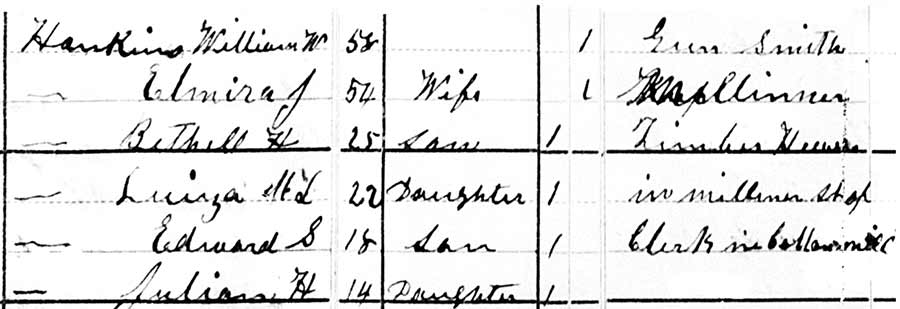
Bethel S.
Hankins is
listed
incorrectly
as "Bethell
H. Hankins."
He was a
"timber
hewer" so
must have
been a
strong young
man.
Slashes in
columns 4
and 5 are
for single
and married.
Mouse over
the photo to
see names.
Photo
identification
is from
WikiTree
William
Wesley
Hankins
(standing,
2nd from
right) and
his
children,
ca.
1890-1897.
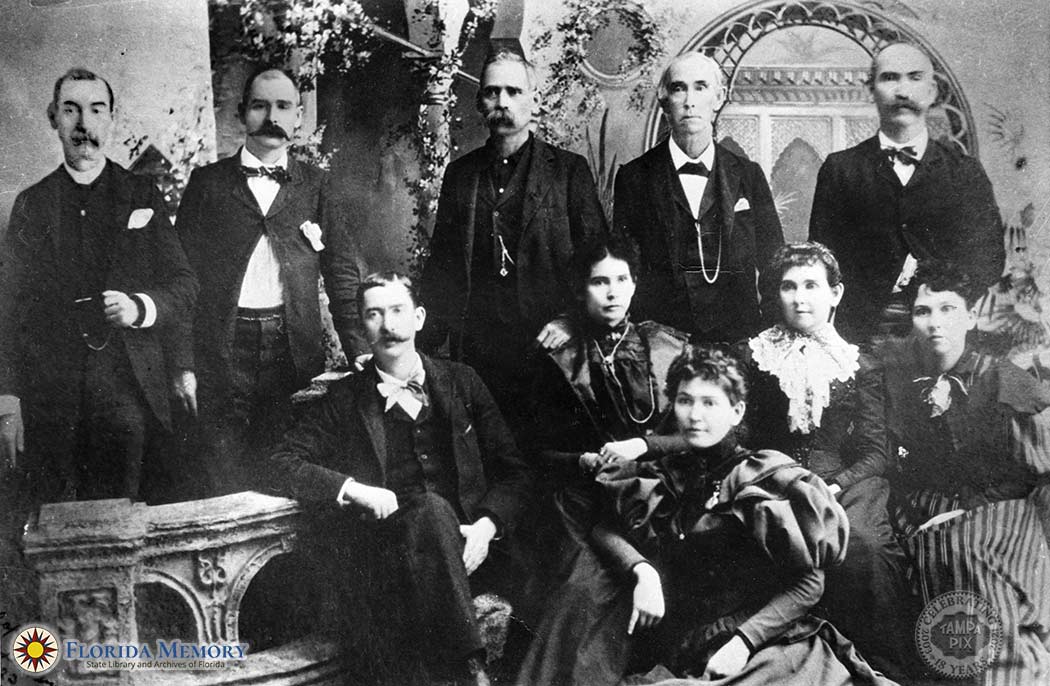
Photo
courtesy of
Florida
Memory,
State
Library &
Archives of
Florida.
The Hankins
family lived
in Bartow,
Fla.
William W.
Hankin's
wife is not
in the
photo, she
died in
1890.
This photo
was taken
sometime
after the
death of
Almira Jane
(Church)
Hankins in
Mar. 1890,
to around
1895.
Edward S.
Hankins died
in Key West
in Sept.
1899.
|
This was Albartus Church "Doc" Hankins |
|
|
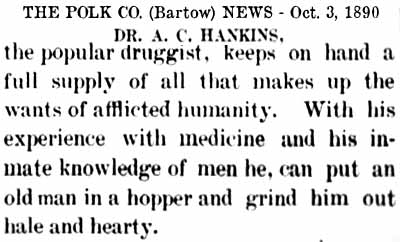
THE START OF THE GOLD HOTEL IN BARTOW Apparently, there was a question going around as to just who was building the Gold Hotel. This article identifies B. S. Hankins of Sanford as the hotel's owner. |
This was
Albartus
Church
"Doc."
Hankins'
drug
store.
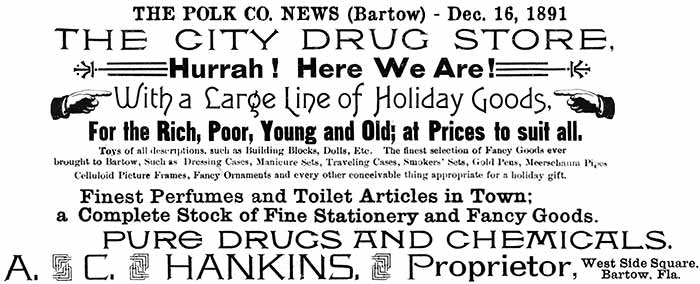 |
|
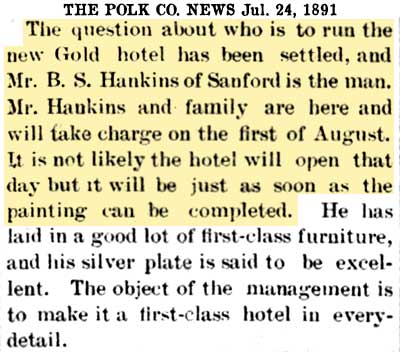
|
The Gold Hotel opened on Aug. 19, 1891 and was described as "large and magnificent." Mrs. B. S. Hankins was highly praised for her experience with all the details of a first-class hotel, as well as her politeness and hospitality.
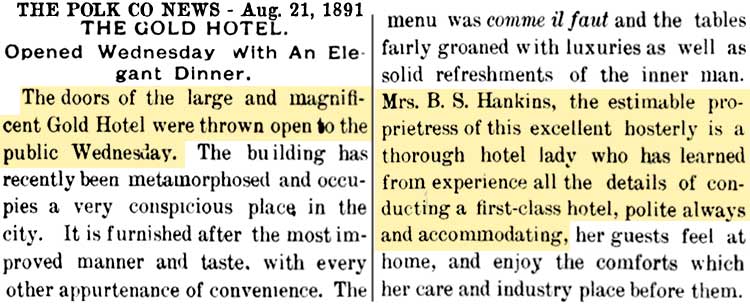
|
|
|
|
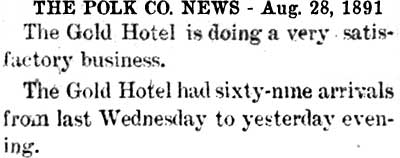
|
There were several fine hotels in Bartow at this time, but none appeared to advertise in the local paper. Ads for hotels were all for out-of-town resorts.
Short articles such as these would be published occasionally. The issues of the Polk Co. News run from Sep. 5, 1890 to Mar. 10, 1892 and the last mention of the Gold Hotel is the one seen below on Jan. 20, 1892. So they probably moved to Tampa after that time. |
 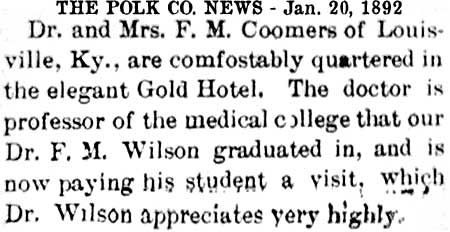
|
|
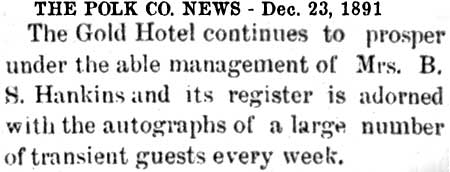
|
|
THE HANKINSES IN BUSINESS IN TAMPA
As indicated above, the last mention of the Gold Hotel in Bartow, and thus, evidence of Mr. & Mrs. B. S. Hankins residing in Bartow, was Jan. 1892. As seen in this section below, they were operating businesses in Tampa by late Sep. of 1895.
By Sep. 1895, Mr. & Mrs. Bethel Hankins were in Tampa, each conducting their separate businesses. Bethel Hankins partnered with Mr. Parker at the Missing Link Saloon at the northwest corner of Franklin & Cass streets. "Recently remodeled, refitted and refurnished..." Their ads began on Oct. 5, 1895.
|
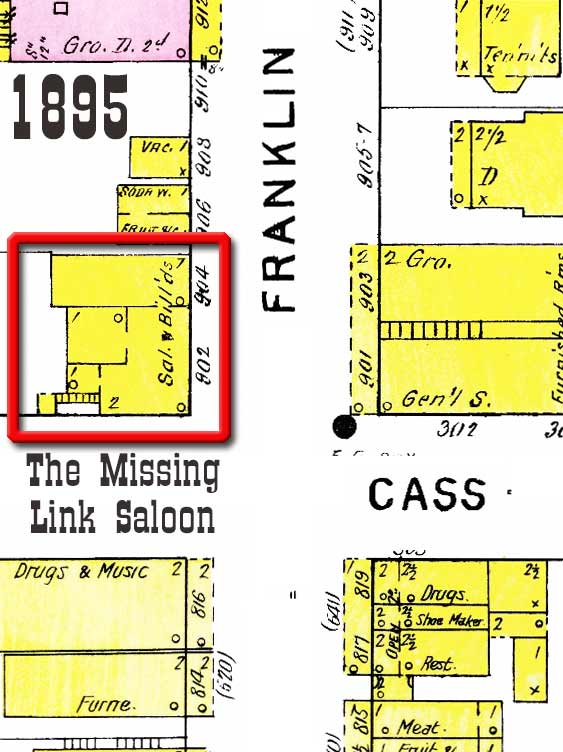 |
|
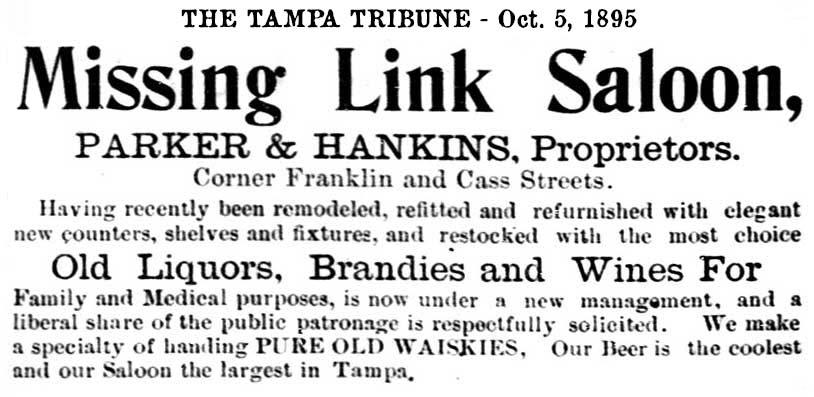 |
|
HOW LONG HAD
THE MISSING
LINK BEEN IN
BUSINESS? |
|
|
The Missing
Link Saloon
was first
opened in
Tampa by E.P.
Gibson and
W. S.
Hancock in
Jan. 1887.
This ad ran
through May
1887. |
Nothing more is found about the Missing Link after their May 1887 ads until Jan. 1895 when W. S. Norman bought it. It apparently had become a place of low moral reputation as the article says Norman would "greatly elevate the moral reputation" of it. |
|
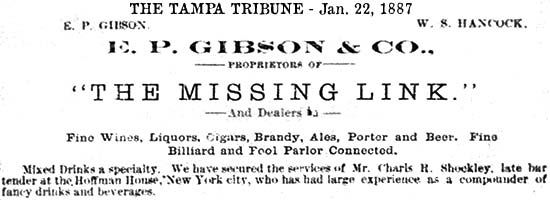 |
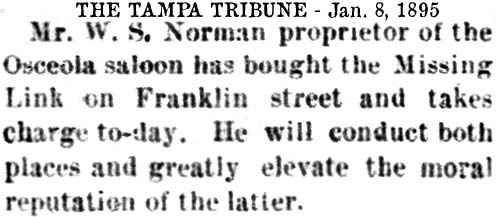
|
|
1885 Census,
Tampa
E. P.
Gibson,
single, age
29,
Occupation:
Saloon.
born in
Georgia (b.
1855-1856)

Supposedly
from 1893:
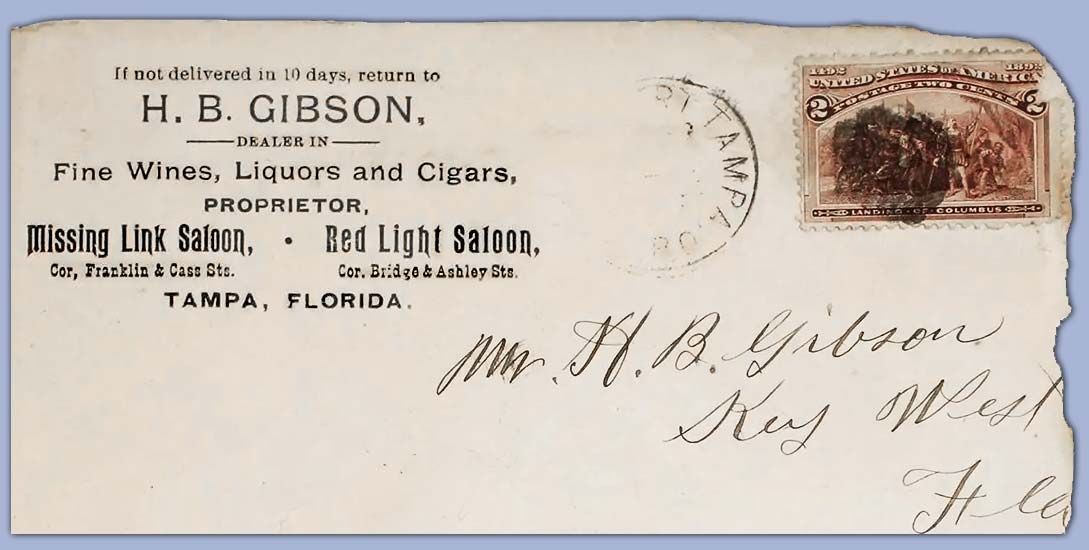
| |
Newspaper articles mentioning H. B. Gibson: |
|
H. B. Gibson
may be a
brother of
E. P.
Gibson.
The
locations of
his two
saloons on
his mailing
envelope are
seen below
on these two
1892 Sanford
Maps.
|
1890 Mar 06
Hotel
arrivals at
the Almeria, Henry Gibson
and wife.
1893 Nov 24 H. B. Gibson charged with keeping a gambling house
1895 May 09
Cases
disposed of
Henry B.
Gibson
keeping a
gambling
house $100
1896 Mar 08
H. B. Gibson
pled guilty
to gambling
fined $25
1896 May 30
Registered
voters H. B.
Gibson 2nd
ward
1898 Apr 26
Registered
voters H.B.
Gibson 2nd
ward |
| |
|
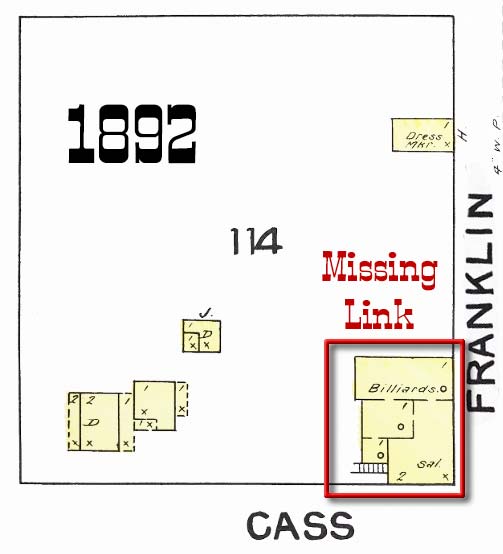
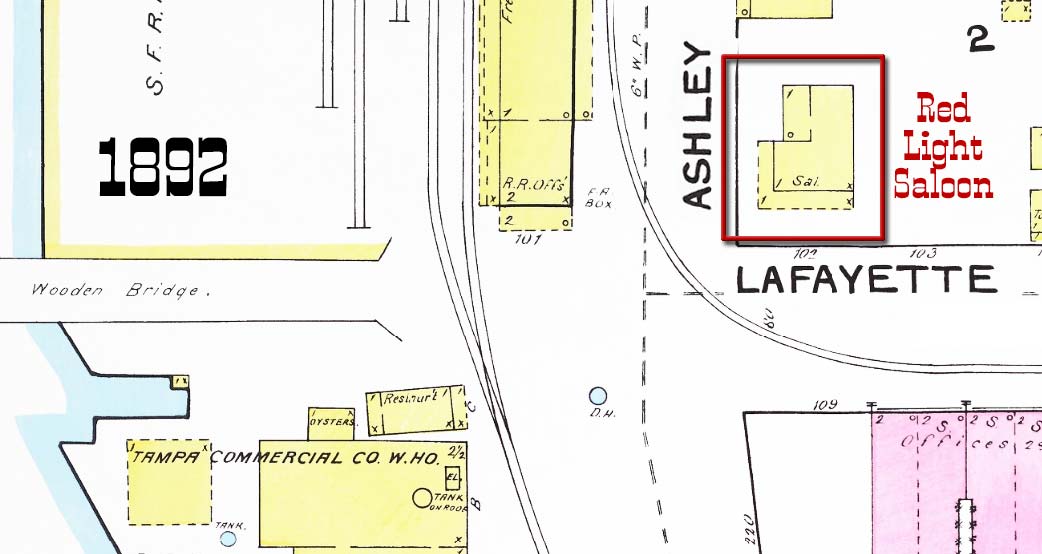
Parker &
Hankins
bought the
Missing
Link,
presumably
from W. S.
Norman, at
some time by
late Sept.
1895, as
this article
about Edgar
Hankins
being
injured
describes
the boy as
the young
son of one
of the
proprietors
of the
Missing Link
saloon. |
|
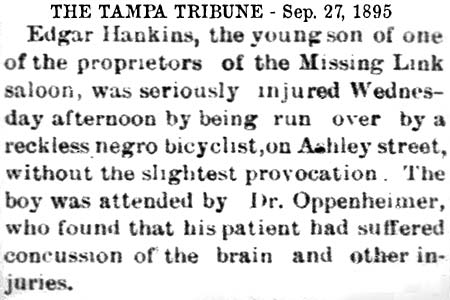
|
Business was booming, but it in the next decades, the north end of Franklin St. would be known as "Skid Row."
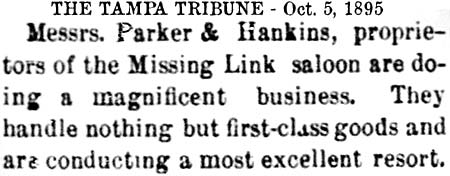
|
|
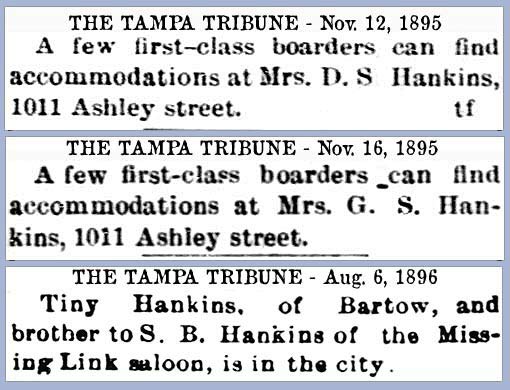 |
MRS. HANKINS
CONTINUES IN
THE
HOTEL/BOARDING
HOUSE
BUSINESS
|
|
Mrs. Hankins
was running
a boarding
house on
North Ashley
St. in Nov.
1895.
This may
have been
their home,
as she
advertised
only for "A
few
first-class
boarders..."
The Tribune
was
inconsistent
on what
initials to
use for her
husband,
Bethel
Stevens "Gilp"
Hankins.
"Tiny"
Hankins was
Edward
Summerfield
Hankins.
|
|
In late
1896, W. T.
Boyd was
remodeling
his saloon
at Franklin
& Polk
streets.
He then sold
to Gilp &
Marter
Hankins. 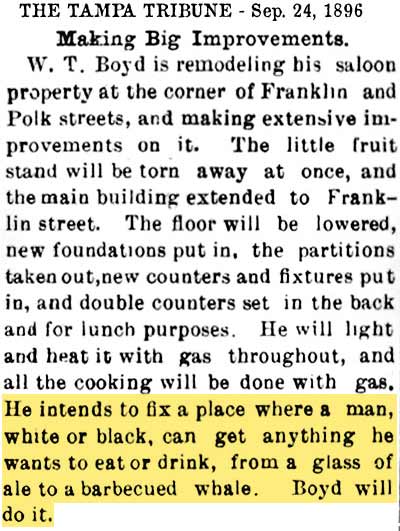
|
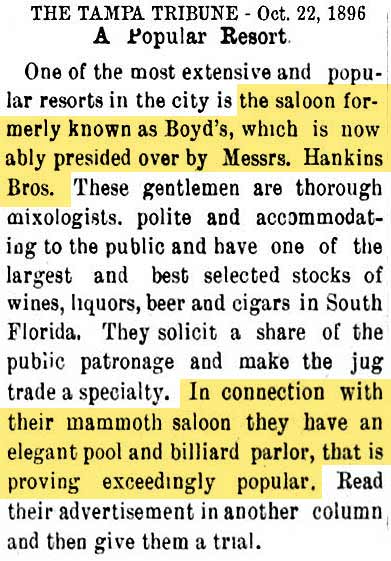
|
Below:
In Nov.
1895, Mrs.
Hankins
leased the
upstairs at
905˝ Franklin
St. and
opened a new
"first-class
boarding
establishment."
She was
well-known
to the
traveling
public as
one of the
cleverest
hostesses in
all Florida,
having
formerly run
the Gold
Hotel in
Bartow.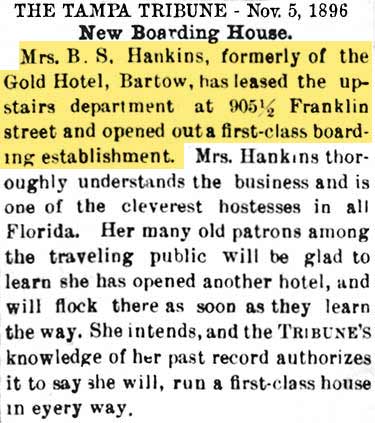 |
|

|
Meanwhile, the Hankins brothers Gilp and Marter had closed the Missing Link Saloon, advertising it was "DEAD! DEAD! DEAD!" and were "still on top in Boyd's corner." |
Mrs. Hankins called her new boarding house at 905˝ Franklin St. the "COMMERCIAL HOUSE," throwing in a reference to her former Gold Hotel in Bartow. |
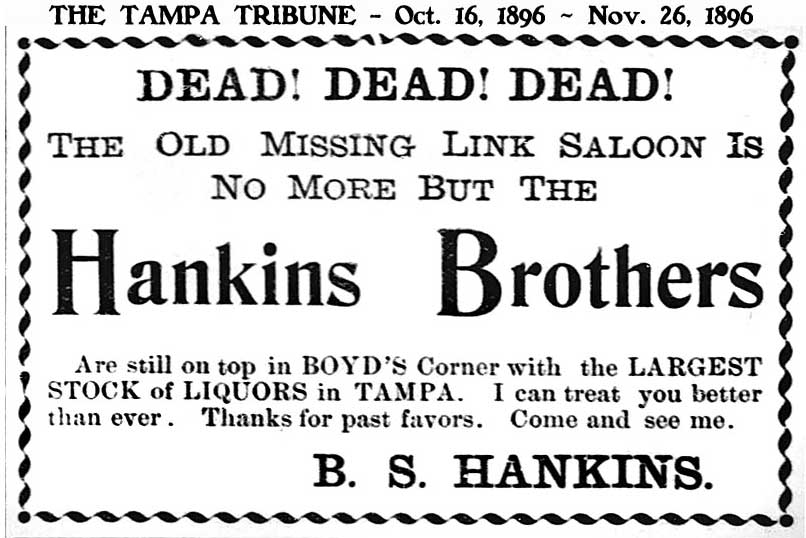 |
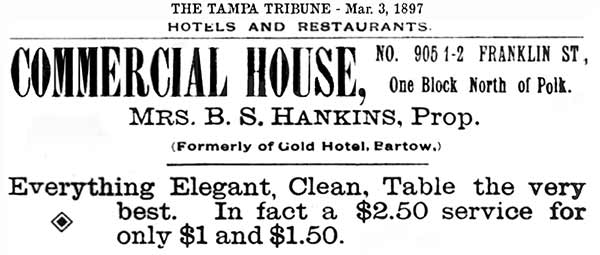
This was
probably
their home. |
FIRE AT THE
COMMERCIAL
HOUSE
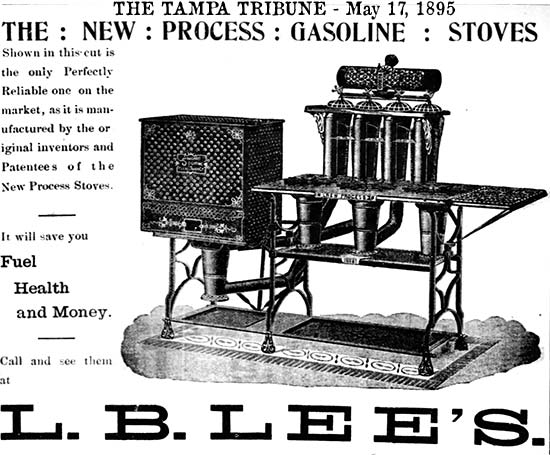 On March 10,
1897, the
cook at the
Commercial
House set
off an
explosion
and fire at
5:30 a.m.
when he
tried
lighting the
stove.
When
occupants
ran to the
kitchen to
see what
happened,
they found
the cook
trying to
throw the
stove out
the window.
First
referred to
as the
"gasoline
stove" but
then says
"It appears
that the oil
had either
not been
turned off
the night
before or
had leaked
considerable
during the
night."
When the
cook, Oscar Clyatt,
tried to
light it, it
exploded,
badly
burning his
face, hands
and arms.
Gilp
Hankins had his
feet
severely
burned while
trying to
put out the
fire
and
much of the
kitchen was
scorched.
Edgar
Hankins, his
young son,
took the
cook to Dr.
Jackson's
office where
he was given
morphine and
later had
his wounds
dressed by
Dr.
Oppenheimer. On March 10,
1897, the
cook at the
Commercial
House set
off an
explosion
and fire at
5:30 a.m.
when he
tried
lighting the
stove.
When
occupants
ran to the
kitchen to
see what
happened,
they found
the cook
trying to
throw the
stove out
the window.
First
referred to
as the
"gasoline
stove" but
then says
"It appears
that the oil
had either
not been
turned off
the night
before or
had leaked
considerable
during the
night."
When the
cook, Oscar Clyatt,
tried to
light it, it
exploded,
badly
burning his
face, hands
and arms.
Gilp
Hankins had his
feet
severely
burned while
trying to
put out the
fire
and
much of the
kitchen was
scorched.
Edgar
Hankins, his
young son,
took the
cook to Dr.
Jackson's
office where
he was given
morphine and
later had
his wounds
dressed by
Dr.
Oppenheimer. |
An 1895 Sanborn map is used here because the next map was for 1899.
It is not a representation of these businesses in 1895.
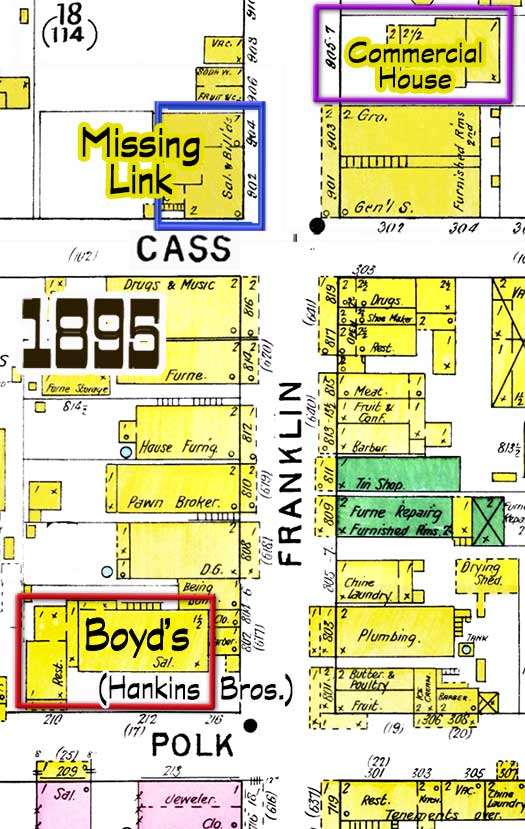 |
|
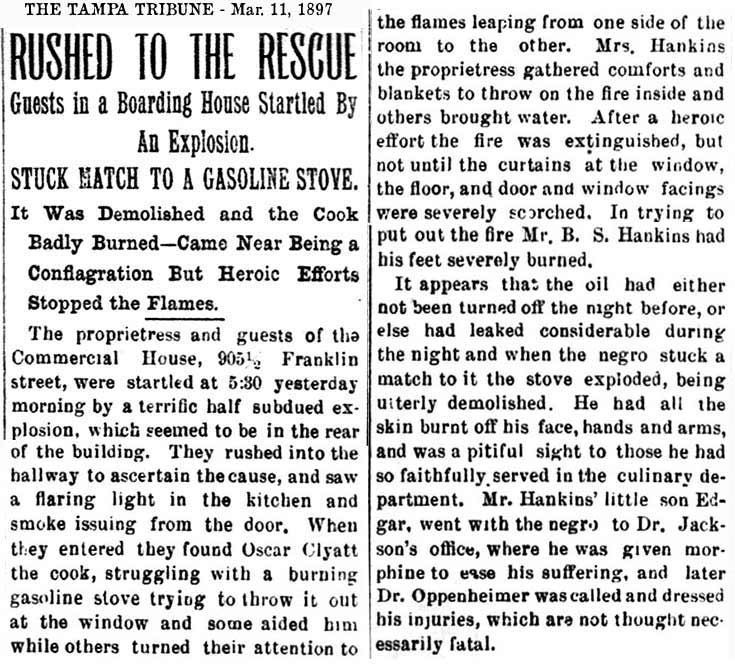
|
BLOODY BRAWL
BETWEEN TWO
PAIRS OF
BROTHERS ON
THE STREETS OF
TAMPA -
HANKINS vs.
MCNEIL
In a letter
to the Gulf
Coast Breeze
(Crawfordville,
Fla.)
newspaper
from an
unnamed
writer,
published
Aug 13, 1897
about the
Aug. 4th
street fight
between the
Hankins
brothers and
the McNeill brothers,
this was
said of the
Hankins and
McNeill families:
The Hankins brothers were originally from Middle Florida. Their father, Hon. William Hankins, was a noble true and good man. He represented at different times, the counties of Madison, Lafayette, and Suwannee in the Legislature and while under his control, Marter and Gilp Hankins were extra good boys. Their older brother, Hon. W. D. Hankins, of Lafayette County, followed in the footsteps of their honored father, but Marter and Gilp engaged in the liquor saloon business, and followed the course of the average man in that business. For the past ten years or more, they have enjoyed the reputation of being violent and dangerous men.
|
The McNeill brothers are originally from Sumter County, Geo. James C. McNeill is an architect, and is sole proprietor of the Tampa Planing Mills and Novelty Works. For several years he identified with the city government of Tampa as President of the Council and Mayor pro tem. Lee McNeill assisted his brother at his mills, until disabled by the loss of a hand in the machinery. Since then he has been in the employ of the city as manager of the city cemetery (Oaklawn.) |
Tampa City Council Members |
|
Tampa City Council Members |
March 4, 1892 – March 10, 1893
Source: Council Minute Book #3, p.56.
James C. McNeill, President
George T. Chamberlain, President pro tempore
Louis G. Cone
Isaac S. Craft
Henry L. Crane
Jose Gomez
William H. Kendrick
Peter O. Knight
James W. Roberts |
March 10, 1893 – March 9, 1894
Source: Council Minute Book #3, p.211.
James C. McNeill, President
George S. Petty, President pro tempore
George T. Chamberlain
Henry L. Crane
Robert W. Easley
William H. Kendrick
Peter O. Knight
John S. McFall
Emilio Pons
Ramon Rubiera de Armas
John Savarese |
| |
|
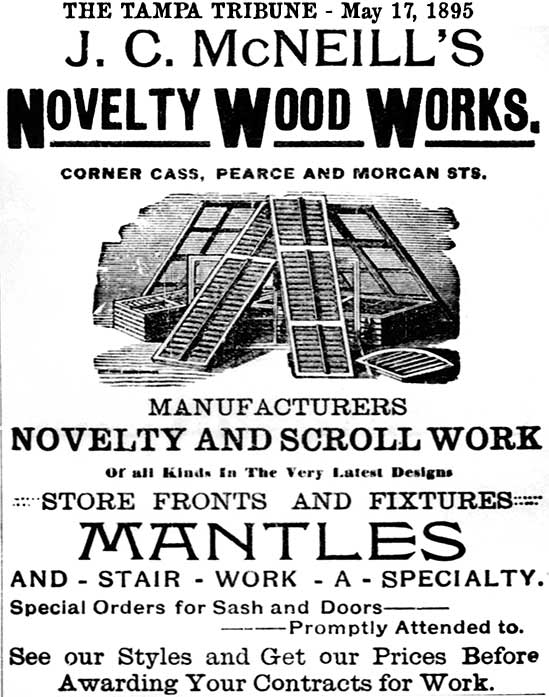
|
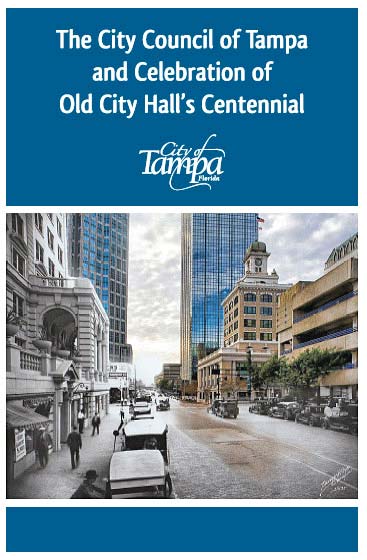 JAMES C. McNeill - Born on July 2, 1858, James C. McNeill was the proprietor of Ybor City Novelty Works and also worked as a foreman at Tampa Lumber Company. He was a member of a committee created by the Board of Trade to police a cigar worker’s strike in 1892. With fellow council member Louis G. Cone, McNeill was elected to represent Tampa’s First Ward, the downtown area. He served two consecutive terms as the President of Tampa’s City Council. He died on February 26, 1948.From "The City Council of Tampa & City Hall Centennial Celebration" JAMES C. McNeill - Born on July 2, 1858, James C. McNeill was the proprietor of Ybor City Novelty Works and also worked as a foreman at Tampa Lumber Company. He was a member of a committee created by the Board of Trade to police a cigar worker’s strike in 1892. With fellow council member Louis G. Cone, McNeill was elected to represent Tampa’s First Ward, the downtown area. He served two consecutive terms as the President of Tampa’s City Council. He died on February 26, 1948.From "The City Council of Tampa & City Hall Centennial Celebration"
|
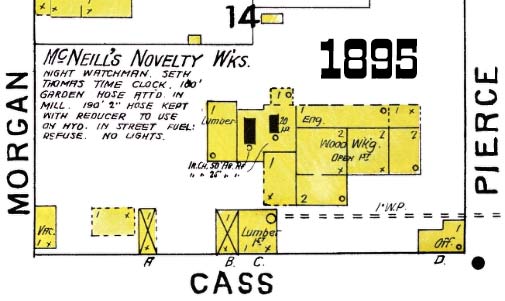 |
|
|
THE MURDER
OF GILPIN
HANKINS
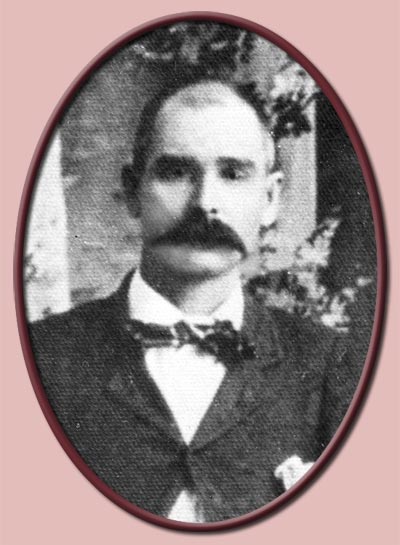 |
|
Bethel S. "Gilp"
Hankins |
About five
months after
opening the
Commercial
House
boarding
house, Mrs.
Hankins was
widowed in
early Aug.
1897 when
her husband
Gilp
Hankins, and his
brother, Sylvanus
Masters "Marter"
Hankins,
were
involved in
a street
fight with
the McNeill brothers
James C. and
Lee. Gilp Hankins
had been co-owner
of "The
Missing Link
Saloon"
in 1895 and
in late 1896
closed it
and opened
the
"Hankins
Brothers
Saloon" with
his brother Marter.
On Aug. 4,
1897, around
10 p.m.,
Marter and
Gilp Hankins
encountered
the McNeill brothers on
the streets
at Franklin
and Harrison.
An argument
over an old
gambling
debt J. C.
McNeill owed
to Gilp
ensued,
which turned
into a
fight.
When the men
began to
fight, J.C.
McNeill produced a
knife and
slashed Gilp's
throat, then
stabbed him
in the
chest.
From behind
a telegraph
pole, Lee
drew his gun
and fired
twice at
Marter
Hankins but
missed both
times.
Then he
fired twice
at Gilp
Hankins,
hitting
him in his
thigh, and
in the
back--between
his shoulder
blades.
Gilp Hankins
died the
next day.
At right:
Locations of
the
Missing
Link
Saloon,
Hankins
Bros.
Saloon,
&
Commercial
House.
|
Sylvanus Masters "Marter" Hankins
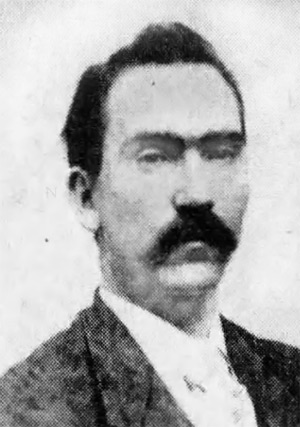 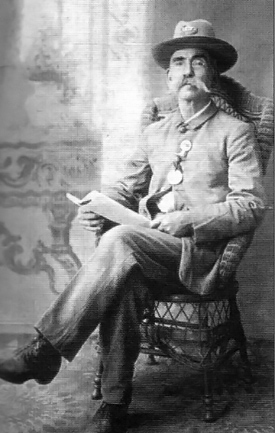
Brother of Bethel S. "Gilp" Hankins
Photo on left from Tampa Tribune article on Sept 27, 1987 (below)
Photo on right by Judy Llamas at Find-a-Grave 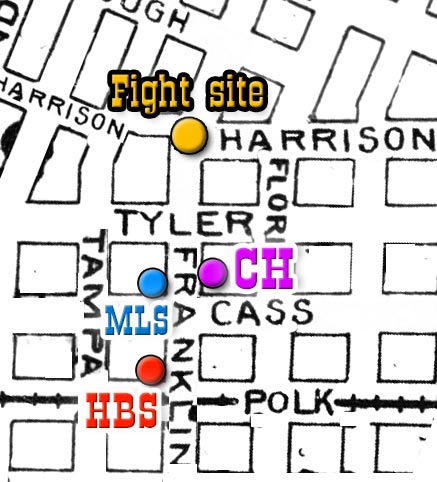
|
|
THE BLOODY
BRAWL
|
The fight took place around 10pm on Wednesday, Aug. 4, 1897 at the corner of "the Rock Road" and Franklin St. Later articles refer to it as near Harrison St. The article says "Knives and pistols were used freely..." but there is no mention in any other articles or at the trial that the Hankins brothers had any weapons. Hankins was carried "nearer dead than alive to the Commercial House, of which his wife is the proprietress." The place soon drew a crowd. According to Marter Hankins, J. C. McNeill had some trouble around 2 years earler which he thought had been settled, but was suddenly renewed that night when they met on the street. "After a few words had passed, J. C. McNeill suddenly drew his pocket knife and with one slash cut Gilp's throat, then "plunged it into his victim's breast." Lee McNeill drew a pistol and fired twice at Marter, missing each time, then fired three shots at Gilp, hitting him between his shoulder blades, abdomen, and left thigh. It took some time to find a doctor; first to arrive was Dr. Douglass and a Cuban doctor whose name they did not get. As Gilp Hankins was "sinking rapidly," his father was telegraphed in Bartow. After a search of the area by the police and sheriff, the McNeill brothers were found at home where they quietly surrendered. |
|
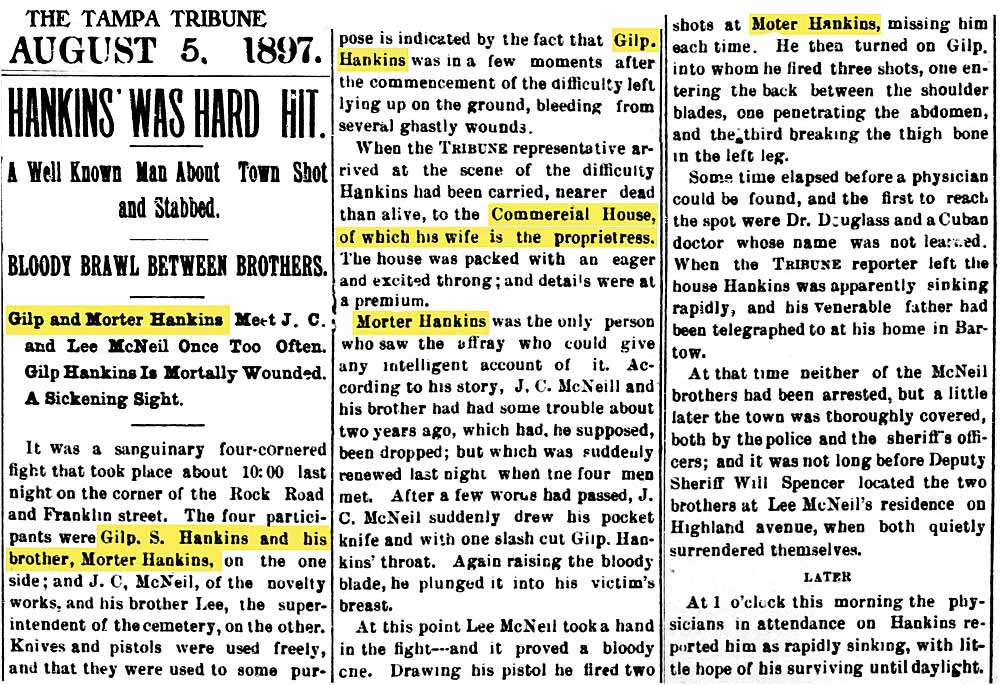
|
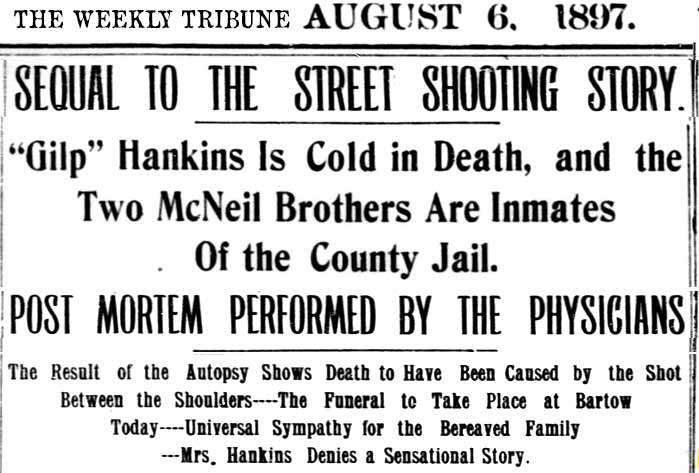
The coroner determined it was the gunshots that killed Hankins, so Lee and James McNeill were arrested and charged with murder and manslaughter. The only eyewitness other than the fighting pairs of brothers was E. E. Long who saw the fight from across the street. "Mrs. Hankins Denies a Sensational Story." READ THE ENTIRE ARTICLE SEEN AT RIGHT For all the article links in this feature,
when the article opens, click it again to see it full size.
| |
READ THE ENTIRE ARTICLE BELOW |
|
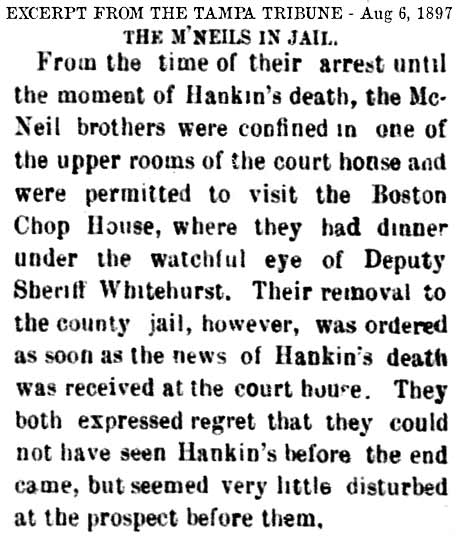 |
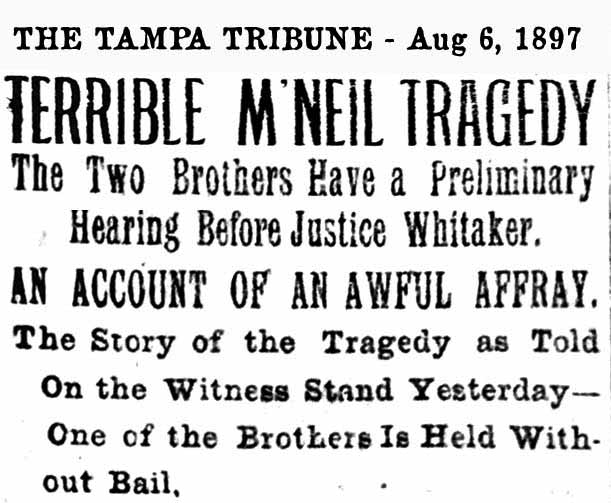
A preliminary hearing was held on Aug. 5, 1897 for both men on murder charges.
Marter Hankins testified at the hearing that the McNeils had just crossed Franklin St. from the "Greater New York Saloon." Witness E. E. Long testified that he was approaching the corner of Franklin and Harrison when he heard the shouting coming from Harrison St.
The coroner and witnesses testified, and after the afternoon break, Judge Whitaker rendered his decision. He ruled that Lee McNeill be charged with murder and held in jail with no bail, and that J.C. McNeill be charged with manslaughter and jailed on a $7,000 bond. In the article published in the Tampa Tribune Sat., Aug, 7, it was expected that J. C. would post bail that Monday. |
FUNERAL OF BETHEL S. "GILP" HANKINS
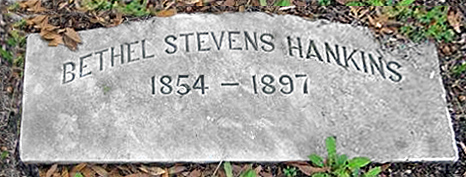
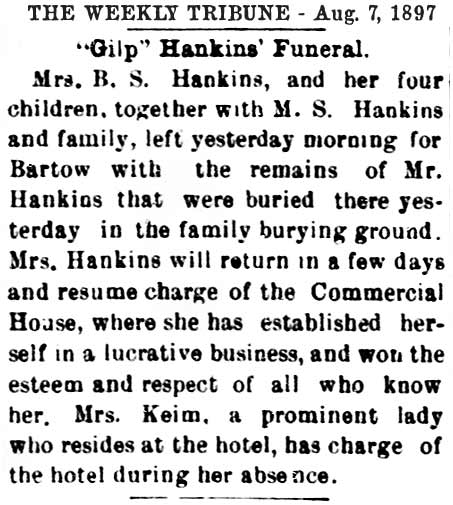
On Aug. 6,
1897, the
day after
Gilp's
death, his
widow and
four
children
(Eugene 12,
Edgar 11,
Corrine 9 &
Bethel S.
Hankins, Jr.
3), along
with Gilp's
brother
Marter
(incorrectly
referred to
as "M. S.
Hankins) and
his family,
took Gilp's
remains to
Bartow where
his funeral
and burial
in the
family
cemetery
took place.
Photo by
Judy Llamas
at
Find-a-Grave
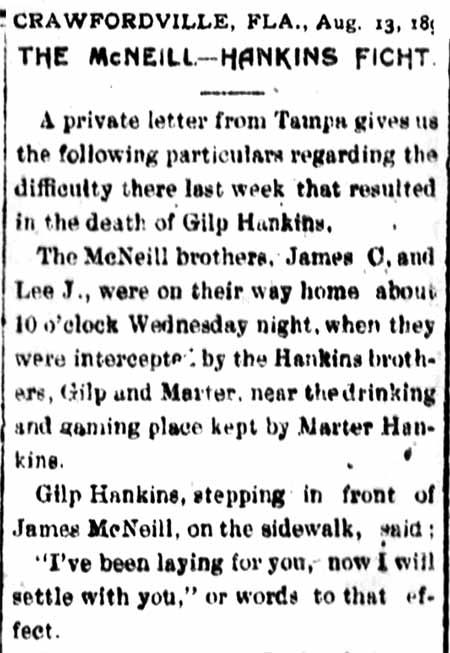
THE
CRAWFORDVILLE
"GULF COAST
BREEZE"
PRINTS A
LETTER FROM
TAMPA
Crawfordville
is located
about
fifteen
miles
south-southwest
of
Tallahassee
where the
McNeils had
many
connections.
The paper
printed a
story
allegedly
received in
a letter,
the source
unnamed,
giving an
all-for-the McNeils
story of the
fight.
About the
two Hankins
brothers, in
contrasting
their
occupations
with the
other men of
the Hankins
family,
the article says:
"...but Marter and Gilp engaged in the liquor saloon business, and followed the course of the average man in that business. For the past ten years or more they have enjoyed the reputation of being violent and dangerous men."
This article
reveals
that Lee
McNeill was
"crippled"
having lost
one hand in
a sawmill
accident.
The article
alludes to
both the
Haskin's
brothers to
be
considerably
larger than
the McNeils.
READ THE
WHOLE
ARTICLE
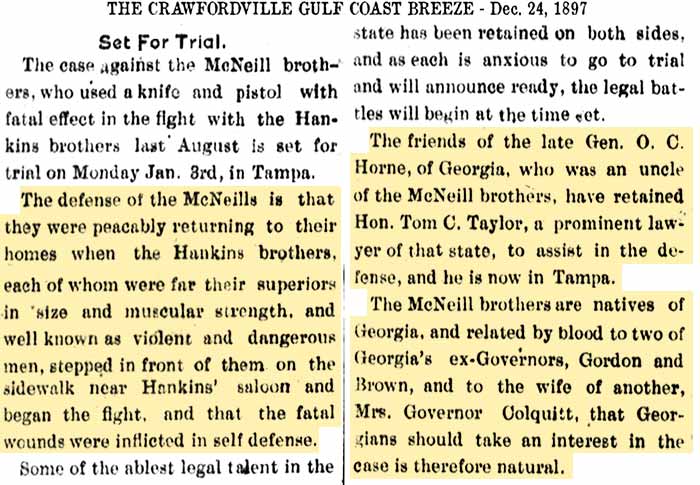
HANKINS BROS. PORTRAYED AS AGGRESSORS, MCNEILLS AS INNOCENT VICTIMS This Christmas Eve article in the Gulf Coast Breeze claims the McNeils were "peaceably returning to their homes when the Hankins brothers, each of whom were far their superiors in size and muscular strength.." and again states that they were "well known as violent and dangerous men" stepped in front of them near the Hankins' saloon and began the fight in self defense. The McNeill brothers' big connections are revealed, friends of the late Gen. O. C. Horne of Georgia having retained prominent Georgia lawyer Tom C. Taylor to assist in the defense, Also, that Mrs. Governor Colquit and two ex-governors of Georgia were related to the McNeils. |
|
THE MCNEILL BROTHERS
TRIAL
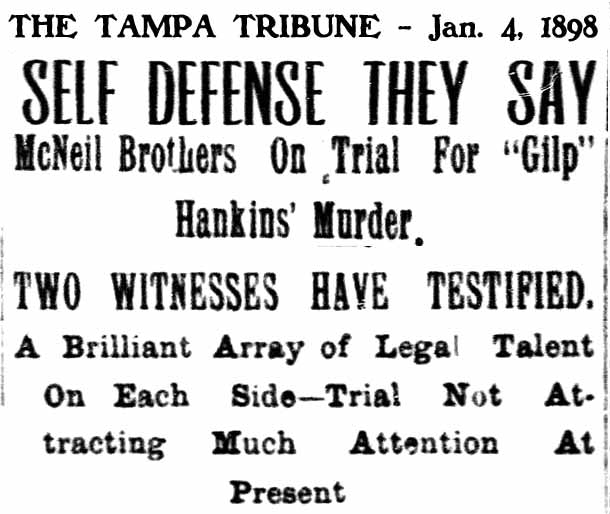 The
trial
started on
Monday, Jan.
3, 1898 with
jury
selection,
which took
up the
morning
session.
The jurors
were D.B.
McKay (the
newspaper
editor and
future Tampa
mayor), B.B.
Simmons,
H.F.
Pollard,
Henry
Clemmens,
C.M.
Clinton, H.H.
Greer, H.T.
Robles, R.F.
Turner, C.E.
Webb, C.H.
Ohme, J.G.
Ball, and
Joseph
Brown. The
trial
started on
Monday, Jan.
3, 1898 with
jury
selection,
which took
up the
morning
session.
The jurors
were D.B.
McKay (the
newspaper
editor and
future Tampa
mayor), B.B.
Simmons,
H.F.
Pollard,
Henry
Clemmens,
C.M.
Clinton, H.H.
Greer, H.T.
Robles, R.F.
Turner, C.E.
Webb, C.H.
Ohme, J.G.
Ball, and
Joseph
Brown.
The McNeils
were
represented
by Hugh
Macfarlane
and F. M.
Simonton,
both of
Tampa, R. D.
McCleod of
Crawfordville,
and Col.
Taylor of
Georgia.
READ THE
ENTIRE
ARTICLE SEEN
AT LEFT
Witnesses
were called
in the
afternoon
session of
the first
day and the
first was
Dr. Bird who
performed
the autopsy.
Next was S.
M. "Marter"
Hankins who
on cross
examination
testified
that Gilp
struck the
first blow
but only
after he had
seen the
knife in one
of the
McNeil's
hands.
The last
part of his
statement
was ordered
stricken
from the
record as
the defense
argued that
the witness
had no right
to tell what
the deceased
saw as that
could only
be a matter
of opinion.
Before his
cross-examination
could be
completed
the court
adjourned
until the
next morning
at 9 a.m.
The jurors
and
witnesses
were given
the usual
caution in
regard to
talk to
anyone about
the case nor
be present
anywhere
that others
may be
discussing
the case.
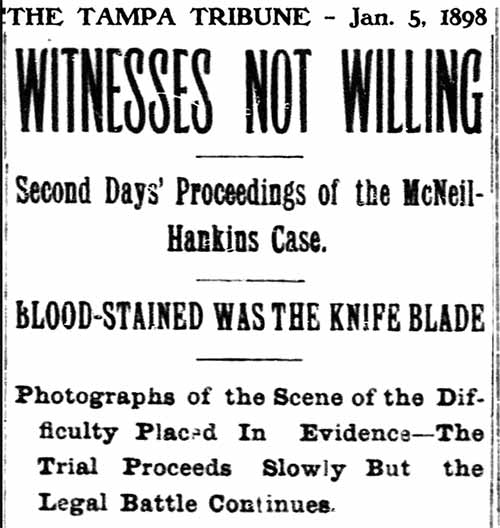 Macfarlane
managed to
discredit
the witness,
E. E. Long,
who
testified he
heard the
shouting and
the shots,
then saw the
men from
across the
intersection
of Franklin
& Harrison.
Long could
not identify
the men and
who said
what.
Macfarlane
argued that
the McNeils
acted in
self defense
(despite the
fact that
Lee fired
multiple times,
once in the
back of
Hankins who
had already
had his
throat
slashed and
had been
stabbed in
the chest.) Macfarlane
managed to
discredit
the witness,
E. E. Long,
who
testified he
heard the
shouting and
the shots,
then saw the
men from
across the
intersection
of Franklin
& Harrison.
Long could
not identify
the men and
who said
what.
Macfarlane
argued that
the McNeils
acted in
self defense
(despite the
fact that
Lee fired
multiple times,
once in the
back of
Hankins who
had already
had his
throat
slashed and
had been
stabbed in
the chest.)
During the
trial,
photographs
of the the
intersection
of Franklin
& Harrison
were used
for
witnesses to
point out
where the
various men
were
standing
during the
incident.
READ THE
ENTIRE
ARTICLE SEEN
AT RIGHT
THE VERDICT
IS IN
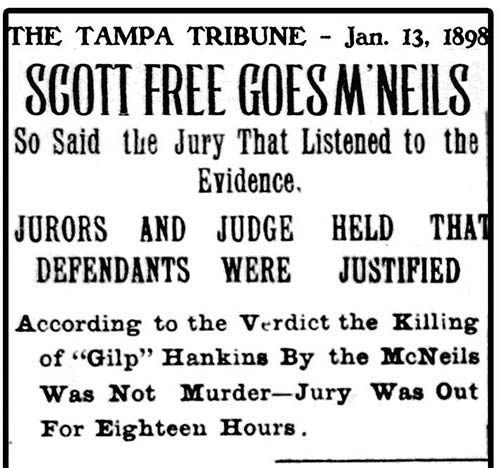
If you want
to know how
two men
armed with a
gun and
knife can
stab and
kill unarmed
men and
plead self
defense and
be found not
guilty then
read this...
READ THE
ENTIRE
ARTICLE SEEN
AT LEFT
JAMES MCNEIL
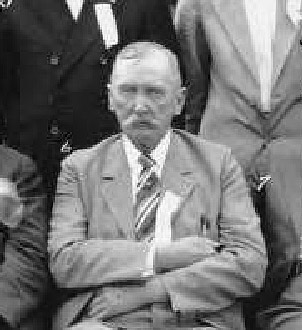 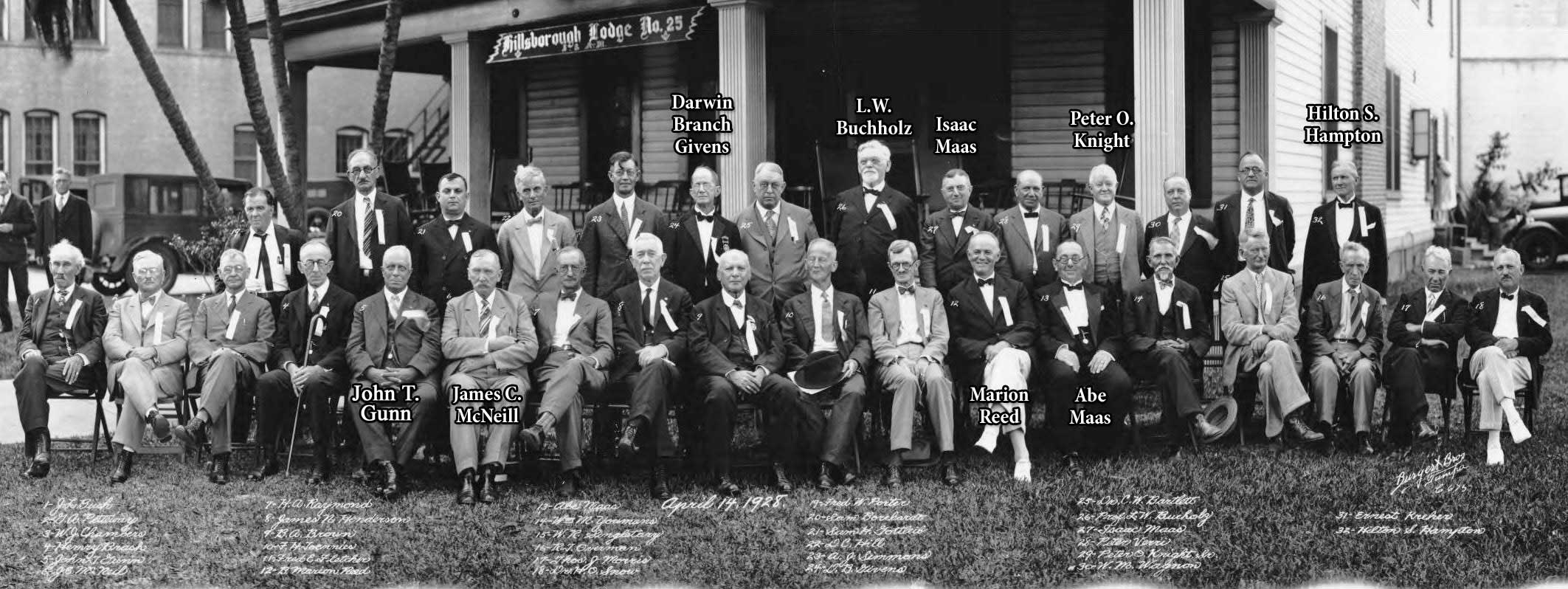
APRIL 14,
1928 -
Senior
members of
the
Hillsborough
Lodge
honored
Click to see full
size.
Photo
courtesy of
the Burgert
Bros.
collection
at the Tampa
Hillsborough
Co. Public
Library
System.
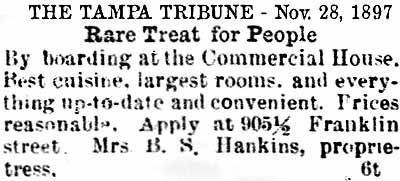
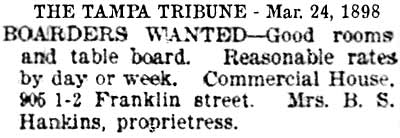 MRS. HANKINS AND
HER FOUR
CHILDREN
AFTER GILP'S
DEATH MRS. HANKINS AND
HER FOUR
CHILDREN
AFTER GILP'S
DEATH
Not long
after Gilp's
funeral in
Bartow,
Mrs.
Hankins,
whose first
name never
appears in
the papers,
returned to
Tampa with
her children
and
continued
operating
the
Commercial
House until
acquiring
the lease of
the DeSoto
in early
April,
1898.

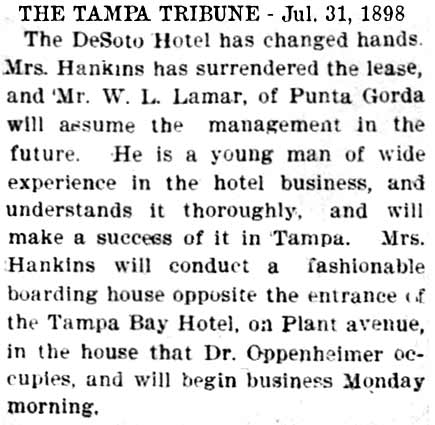
MRS. HANKINS LEAVES THE DESOTO
By the end
of July
1898, Mrs.
Hankins left
the DeSoto
and
opened a
fashionable
boarding
house in
Hyde Park
across
from the
Tampa Bay
Hotel on
Hyde Park
Avenue.
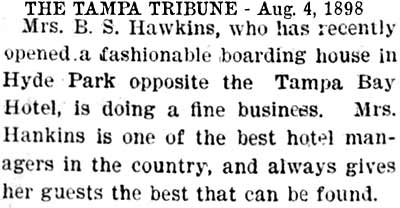
|
After about eight
months, in
late March
of 1899 she
was done
with that
venture and
took charge
of the
Crescent
Hotel
on
Tampa Street
near
Harrison,
which she
"furnished
elegantly
and equipped
with all of
the modern
improvements." |
The open lot just north of the Crescent was where the well-known St. James Hotel was located. The St. James faced Franklin St., the Crescent faced Tampa St. The two hotels existed at the same time at least from May 1894 to Dec. 1897.
Mouse over the map to see the area in 1895. 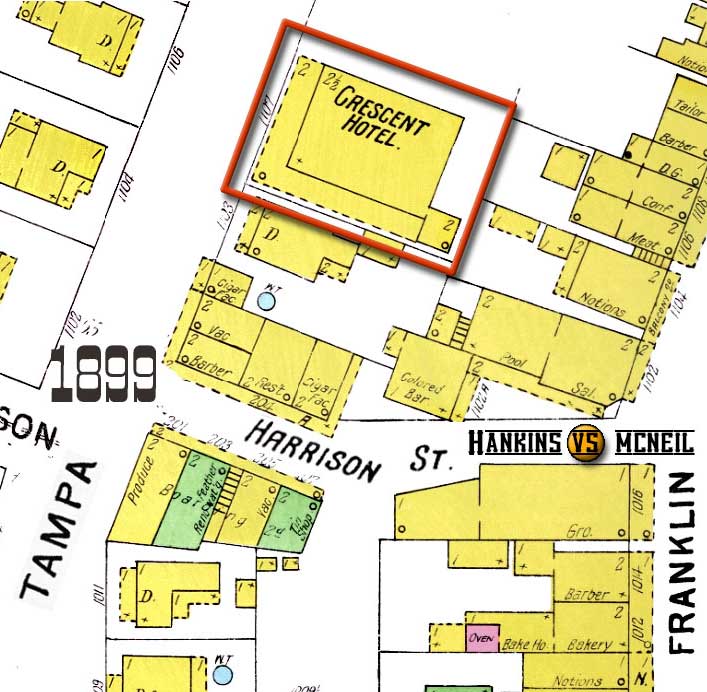
|
1886 May 26 Ad for coffee delivered free, located opposite St. James Hotel.
1887 May 05 St. James Hotel ad
1892 May 23 - Old St. James Hotel on Franklin being repaired with new additions.
1894-05-11 First mention of Crescent Hotel. Mrs. Geo. W. Sparkman passed away at the Crescent Hotel.
1895 Jan 12 - Mrs Fudge arrival to bedside of daughter Mrs. W.H. Kendrick at the Crescent Hotel
1895 Feb 26 - Fire at stable at residence on corner of Harrison & Franklin, started by boy who lives at the St. James Hotel.
1895 May 02 Ad by Mary Milton Dressmaker at the Crescent Hotel.
1895 Dec 20 - Reference made to Mrs. Jones OF the Crescent Hotel.
1896 Feb 12 - JR Campbell of the St James Hotel on committee in Jax.
1896 Aug 13 - Defective flue in kitchen of the "Crescent or St. James Hotel near the corner of Franklin & Harrison. Furniture & furnishings considerably damaged by water.
1896-Aug 15 - Crescent hotel owners petition for permission to fill lot on which it stands, Granted.
1896 Aug 20 - Crescent hotel temp. closed
1897 Apr 22 - Guests at the St. James Hotel
1897 Jul 25 - Entertainment given at Crescent Hotel.
1897 Dec 16 Last mention: Guests at the St. James Hotel
1898 Oct 20 Dead Cuban suicide found at lot adjoining Crescent Hotel.
To this point very few articles a year mention the Crescent, and no ads found. Then Hankins takes over.
1899 Mar 24 - Mrs Hankins taken charge of the Crescent. Ads appear every week.
1899 Sep 12 - Mrs Hankins closes Crescent, moves to Savannah permanently.
|
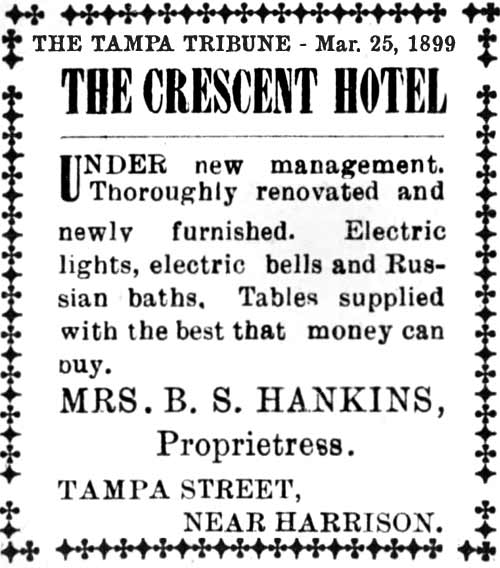
The first
mention of
the Crescent
Hotel was on
May 11, 1894
when Mrs.
George W.
Sparkman,
who was
living
there,
passed away.
The last
mention of
the St.
James Hotel
was on Dec.
16, 1897
about a
notable
guest who
had checked
in there. |
| No article could be located about what happened to the St. James, it may have been demolished or destroyed in a fire some time from 1898 to 1899, since the 1899 Sanford map shows a vacant lot where the St. James once stood. The first six months of the Daily Tribune are missing for 1898, but the Weekly Tribunes are available yet make no mention of the St. James. |
| DR. HIRAM M. BRUCE |
First Term: Mar. 8, 1888 - Mar. 6, 1889
Second Term: Apr. 2, 1890 - Mar 4, 1891 |
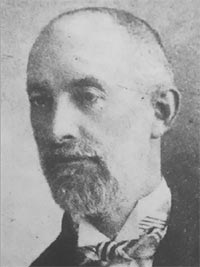
|
| Born in 1838, Dr. Hiram M. Bruce served in the Union Army in the Second Ohio Calvary during the Civil War. He came to Tampa after the war and practiced medicine. He was a doctor by profession as was his wife, Dr. Orpha Baldwin. In addition to his successful medical practice, he also opened the St. James Hotel in 1884. Advertisements for the hotel show that it offered a billiard room as well as 405 feet of verandas. Election results for Dr. Bruce’s second City Council term resulted in a tie between the candidates for the Second Ward, North Tampa. Dr. Bruce won the runoff and was sworn in on April 2, 1890. He died in Tampa in 1922. The above information and photo at right is courtesy of
"The City Council of Tampa and Celebration of Old City Hall's Centennial."
(Don't believe what you read there about how, when, and why the City Hall clock was named "Hortense." Find out the real story here at TampaPix.) |
|
 In regard to the St. James Hotel, Dr. Hiram Bruce's obituary of Oct. 16, 1922 in the Times only states that "He came to Tampa from New York. Here he continued his practice until 1898. During the Yellow Fever epidemic of 1887 he rendered valiant and successful service. He is said to have built the famous old St. James hotel which was known then as 'Tampa's best." His obit in the Tribune makes no mention of the St. James. In regard to the St. James Hotel, Dr. Hiram Bruce's obituary of Oct. 16, 1922 in the Times only states that "He came to Tampa from New York. Here he continued his practice until 1898. During the Yellow Fever epidemic of 1887 he rendered valiant and successful service. He is said to have built the famous old St. James hotel which was known then as 'Tampa's best." His obit in the Tribune makes no mention of the St. James.
|
|
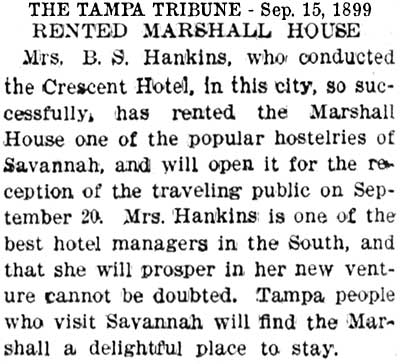
After six
months of
running the
Crescent
Hotel, on
Sept. 29,
1899, the
Tribune
announced
that Mrs.
Hankins
closed the
Crescent
Hotel and
left Tampa
to reside in
Savannah,
GA,
"permanently."
In
Savannah,
she rented
the Marshall
House, a
popular
boarding
house which
she opened
on Sept. 20,
1899.
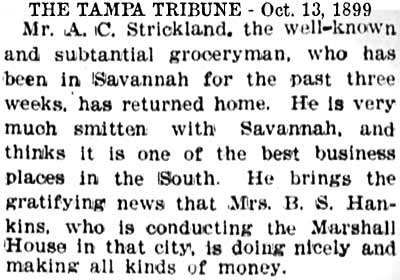
Well-known
and
substantial
Tampa
grocery man
Allen C.
Strickland
visited
Savannah and
upon his
return to
Tampa in mid
Oct. 1899,
he gave a
report that
Mrs. B. S.
Hankins was
doing a fine
business
conducting
the Marshall
House in
Savannah,
and that
"he was very
smitten with
Savannah,"
and "thinks
it is one of
the best
business
places in
the South."
MAGGIE HANKINS LIVING IN JACKSONVILLE BY SUMMER OF 1900Maggie Hankins and her four children, Eugene, Edgar, Corrine, Bethel. Mary Stubbs was Maggie's mother, not mother-in-law.
Mary E. Hankins, listed as a daughter can't be correct. Notice she isn't in chrono order and in 1880 Maggie would have been 11 years old. Mary E. was probably listed in reference to Mary Stubbs and is actually Maggie's sister. See the 1885 Census below for proof. Maggie's child status shows mother of 4 children, 4 living.
Notice Allen C. Strickland listed last as a boarder in the home.
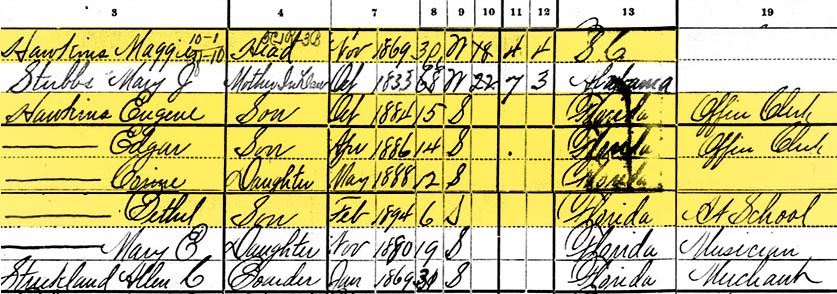
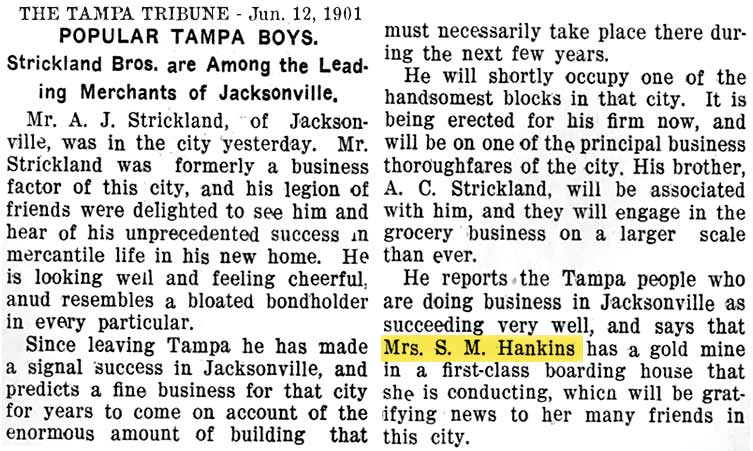
MRS. HANKINS
MARRIES A.
C.
STRICKLAND
IN JACKSONVILLE
By summer of
1901, Allen
C.
Strickland
and his
brother A.
J.
Strickland
had taken
their
grocery
business to
Jacksonville
where they
had
"unprecedented
success."
Apparently,
Allen
Strickland was
smitten
by more than
Savannah,
because on
Dec. 5,
1901, he
married
Maggie A.
Hankins in
Duval
County.
According to
their Duval
Co. marriage
record, he
was 34, she
was 33.
THE ARTICLE
INCORRECTLY
IDENTIFIES
HER AS MRS.
S. M.
HANKINS
1910 Census,
Jacksonville,
Duval Co.,
Fla.
Mrs. B. S.
Hankins is
Margaret
Strickland
Unfortunately,
it appears
that Mr.
Strickland
didn't last
much longer
than
Maggie's
hotels.
The 1910
Census in
Jacksonville
shows
Margaret
Strickland
was now
twice
widowed and
living with
her three
Hankins sons:
Eugene [24],
Edgar [22],
& Bethel
Stephens (Jr.)
[16].
Also listed
was Maggie's
married
daughter
(Corrine
Partridge,
22)and her
husband,
Henry
Partridge,
and their
two very
young
children,
Margaret Ann
(3) & Ethel
Corrine (1).
Listed last
is Maggie
Hankins's
widowed
mother, Mary
Jane STUBBS.
-with-children,-grchild,-mother.jpg)
Margaret appears here at age 38, but using her Florida marriage info, she would have been 42 in 1910. This indicates she was 18 when her first son Eugene was born.
1885 Florida state census, Lafayette County
This is the only census that Maggie and husband Bethel S. Hankins appear together.B.S. Hankins, 32, married, occupation: Merchant, b. Fla.
Mag. A. Hankins, 20, wife, married, b. SC
Eugene Hankins, 1, son, b. Fla.
Mary Jane Stubbs, 50, mother-in-law, wid., b. SC
Lizzie Stubbs, 15, dau**, b. Fla
Susan Stubbs, 12, dau**, b. Fla

|
|
**Lizzie & Susan were listed in relation to Mary Stubbs, they were Maggie's sisters. They should have been listed as "sister-in-law" to the head of house. Lizzie was Elizabeth Virginia Stubbs; she would marry Sylvanus M. Hankins in 1887.
|
| (Intermediate Census records leading to the below record have been omitted.) |
| 1850 Census, Marlboro, Marlboro Co., SC Here is the only census where Mary Jane Stubbs is found with her husband, John J. Stubbs. Mary Jane was 24 years his younger. John Jr. is age 2, and Robert D. age 1. For three censuses John Jr. and Robert's ages are consistently about 10 years apart. 
|
Mrs. S.
B. Hankins
was Miss
Margaret
"Maggie" A.
Stubbs, born
around 1865
in S.
Carolina, a
daughter of
John J.
Stubbs and
wife Mary
Jane.
Maggie's
last known
full name
was Margaret
A. Stubbs
Hankins
Strickland.
Maggie's
sister,
Elizabeth,
was Sylvanus "Marter"
Hankins' 2nd
wife when
they married
in 1887.
|
|
|
|
SYLVANUS MASTERS HANKINS and HIS JOURNEY TO TAMPA
This 1987 article by Leland Hawes of the Tampa Tribune presents some interesting information about Sylvanus M. Hankins, as told to him by a granddaughter, Mrs. Elizabeth Haven Kocher. It presents information from a wonderful account by Mr. Hankins of his Nov. 1883 journey from Live Oak, Fla. to Tampa, and his early impressions of Tampa. Nothing is mentioned about his nickname, or saloon-keeping time in Tampa. Nor does it mention his brother, Bethel S. "Gilpin" Hankins or the incident that took his brother's life. Perhaps Mrs. Kocher was unaware of it or preferred not to reveal it.
Photos from the Florida Memory website name him as "Sylvanus Mortimer Hankins" which would better explain where his "Marter" or "Morter" nickname came from.
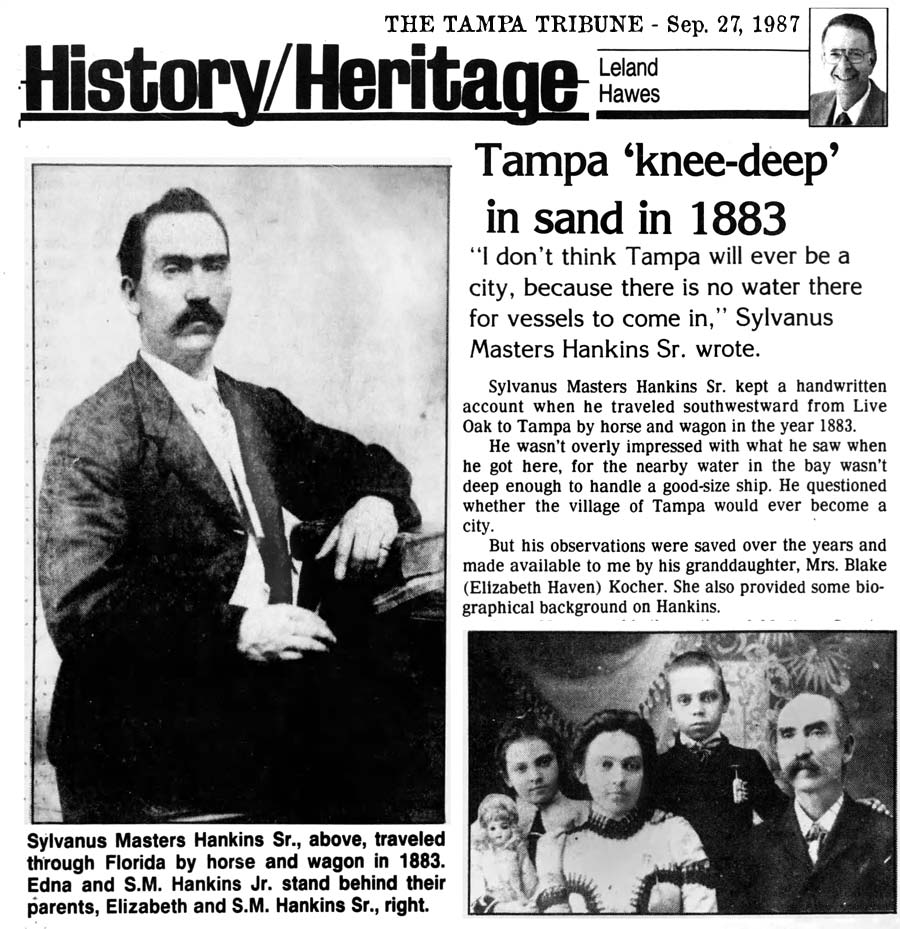
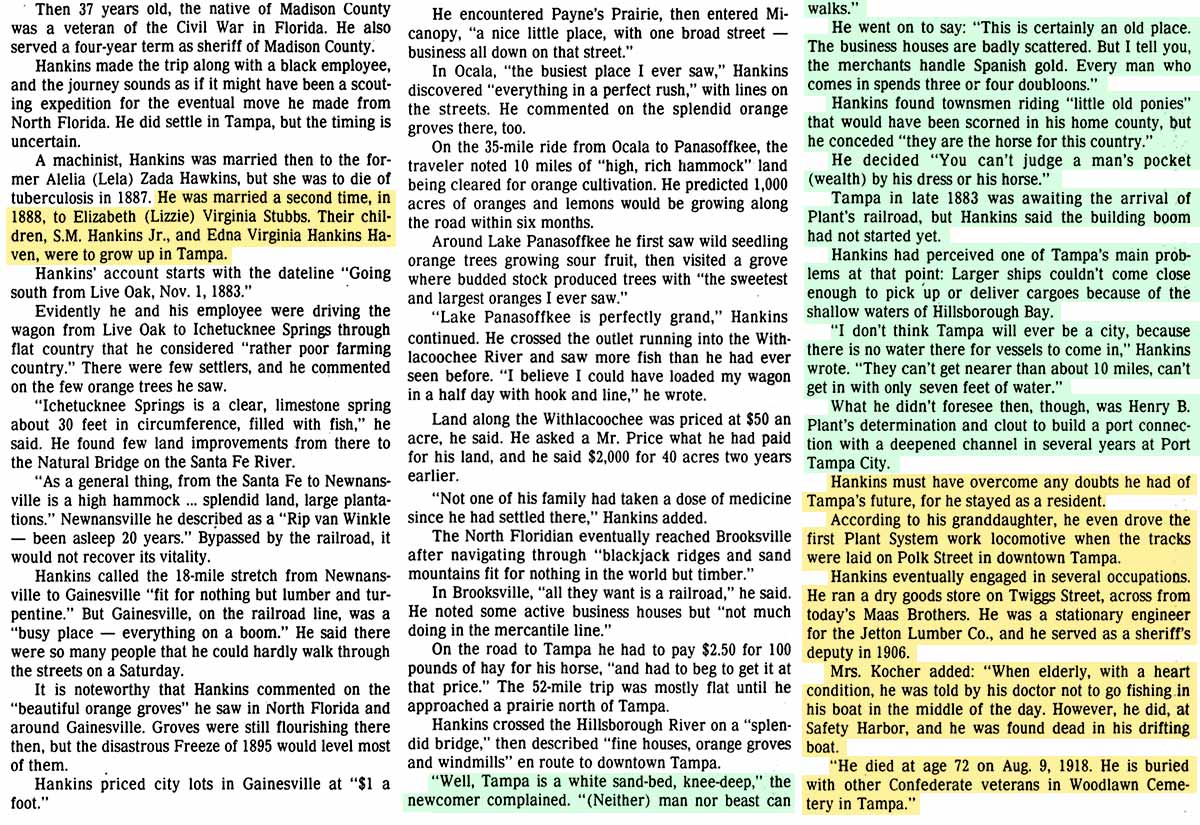
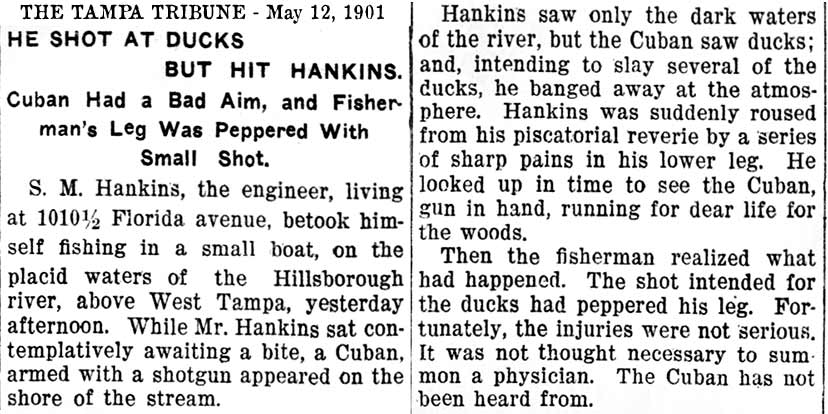 SYLVANUS "MARTER"
HANKINS SHOT
BY DUCK
HUNTER SYLVANUS "MARTER"
HANKINS SHOT
BY DUCK
HUNTER
On May 11,
1901, Marter
Hankins was
fishing on
the
Hillsborough
River in a
small boat,
just above
West Tampa,
when a Cuban
shooting at
ducks
accidentally
hit Hankins
in the lower
leg.
His injury
wasn't
serious and
he didn't
see a doctor
for it.
The Cuban
took off
into the
woods and
was not
heard from.

| |
|
| |
|
|
CONFEDERATE VETERANS AT CONVENTION AT LIVE OAK, FLA.
Oct. 9-10, 1909 |
CONFEDERATE VETERANS AND MEMORIAL AT LIVE OAK, FLA. 1909 |
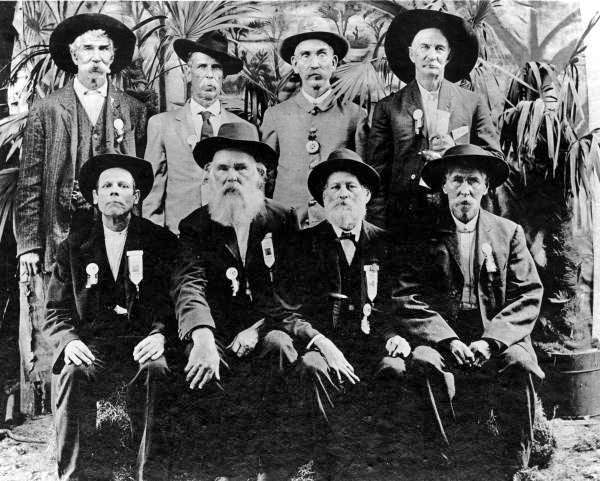 ABOVE: SYLVANUS HANKINS, STANDING, 2ND FROM RIGHT.
These were eight members of the First Florida Reserve Regiment Company D. Photographed at a state convention of Confederate Veterans. Back row (L-R): John T. Clark, S.W. Page, Sylvanus Mortimer** Hankins and Andrew J. Loper. Front row: John D. Willis, Robert Pickles, Joseph P. Webb and Arnett Landing.
AT RIGHT: SYLVANUS HANKINS, FOURTH FROM RIGHT.
These were eight members of the First Florida Reserve Regiment Company D. Photographed at a state convention of Confederate Veterans where a monument was temporarily erected. L-R: Joseph P. Webb, John D. Willis, Arnett Landing, S.W. Page, Sylvanus Mortimer** Hankins, John T. Clark, Robert Pickles and Andrew J. Loper.
(Photo and info from Florida Memory, State Library and Archives of Florida.) **These photos from Florida Memory, State Library and Archives of Florida provide "MORTIMER" as his middle name. According to his granddaughter in the Leland Hawes article, his middle name was MASTERS. His nickname MARTER or MORTER seems to have been similar to both. |
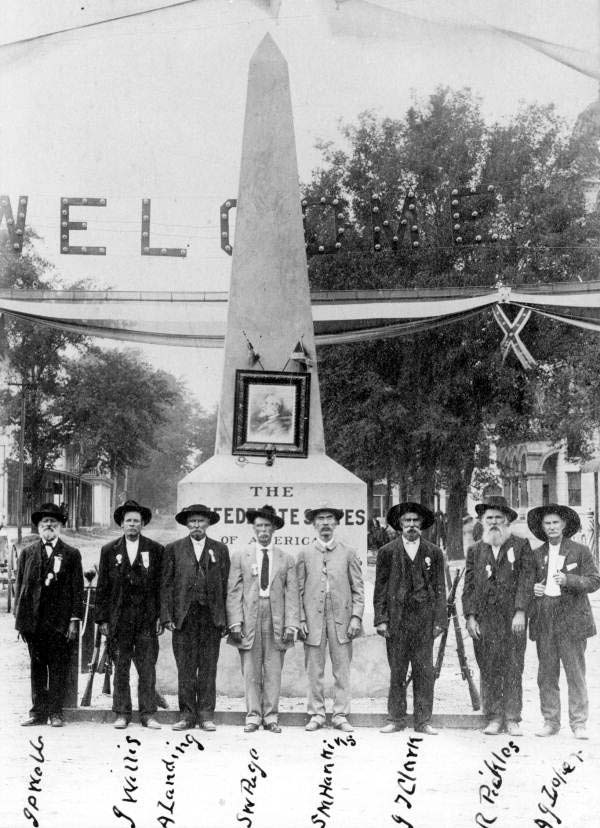
|
| |
|
| SYLVANUS HANKINS IN LAKELAND PARADE, 1914 |
SYLVANUS MASTERS** HANKINS Circa 1910s. |
|
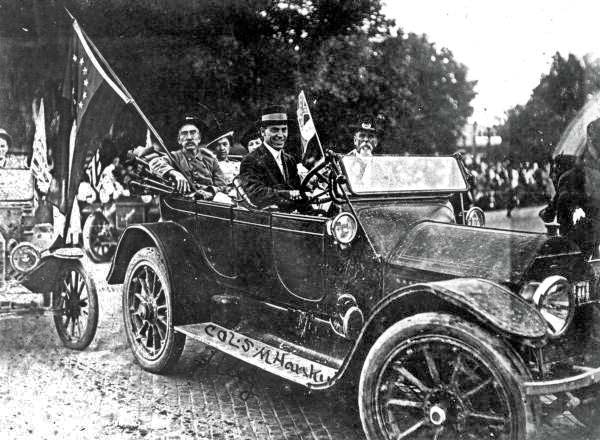
ABOVE: This is part of a parade on Kentucky Avenue celebrating the 30th anniversary of the incorporation of Lakeland and the reunion. S.M. Hankins, holding flag, was the engineer on the first train through Lakeland to Tampa. (Photo and info from Florida Memory, State Library and Archives of Florida.) AT RIGHT: Born on January 15, 1846 as the son of Almaria Church and William W. Hankins in Madison County. Joined Company D, 11th Florida Regiment at Madison County in the summer of 1864, under Captain John H. Bryan. Discharged at Madison at surrender. He married Elizabeth V. Stubbs in Orange County on December 24, 1888. (Photo and info from Florida Memory, State Library and Archives of Florida.) **Sylvanus' middle name MASTERS was provided by the Leland Hawes article |
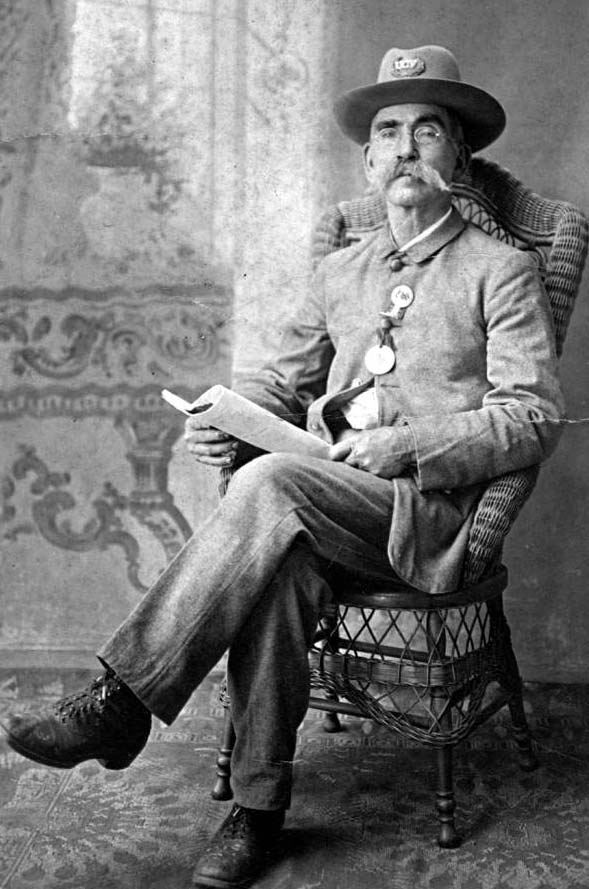
|
| |
S. M.
Hankins'
obituaries
make no
mention of
him out on
his boat.
The article
says he died
at 6 p.m.,
not likely a
time one
would be out
fishing as
Leland
Hawes'
article says
Mrs. Kocher
stated.
Had he been
found dead
in his boat,
the news
likely would
had stated
this and
given a
RANGE of
time that he
may have
died. His obit in
the Tribune
states that
he had gone
there for
the day to
attend to
business
matters.
Mrs. Hankins
had two or
three hotels
in Safety
Harbor
several
years
earlier,
under
various
names, Espiritu
Santo Hotel,
Hankins
Hotel,
Hankins
House were a
few.
Ads to be
added soon.
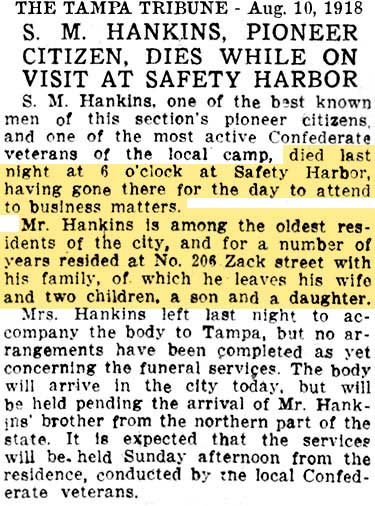
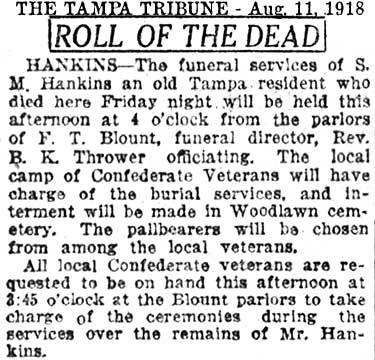
|
This
page
is a
breakout
page
from
"The
History
of
the
DeSoto
Hotel"
TAMPAPIX
HOME
|